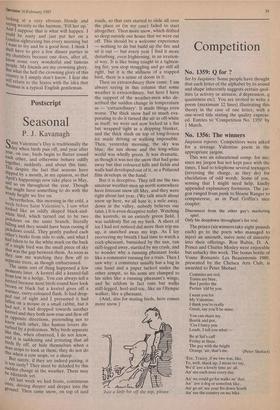Postscript
Seasonal
P. J. Kavanagh
Saint Valentine's Day is traditionally the day when birds pair off, and year after Year, on cue, birds begin to flutter round each other, and otherwise behave oddly together, suddenly, and about this time. This despite the fact that seasons have Slipped by a month, in my opinion, so that 4Pril's happenings now take place in May, and so on throughout the year. Though that might have something to do with the windy height we live on. Nevertheless, this morning in the cold, a Week before Saint Valentine's, I saw what looked like an oddly shaped black-and- White bird, which turned out to be two Jackdaws on the same branch, literally billing and they would have been cooing if Jackdaws could. They gently pushed each other's beaks from side to side, and what I had taken to be the white mark on the back of a single bird was the small piece of sky that was the gap between them. As soon as they saw me watching they flew off to separate trees, as though embarrassed. The same sort of thing happened a few moments later. A kestrel did a kestrel-fall from low in a hedge. You can always tell a kestrel because most birds round here look brown or black but a kestrel gives off a Warmer, curry-coloured flash. It had drop- Ped out of sight and I presumed it had fallen on a mouse or a small rabbit, but it had not it had dropped towards another kestrel and they both now rose and flew off to opposite directions, pretending not to know each other, like human lovers dis- turbed by a policeman. Why birds separate like this, when observed, I do not know, and it is saddening and irritating that all birds fly off, or hide themselves when a Man stops to look at them; they do not do this when a cow stops, or a sheep.
But surely, if they are indeed pairing, it is too early? They must be deluded by this sudden change in the weather. There may be blizzards yet. All last week we had frosts, continuous ones, driving deeper and deeper into the ground. Then came snow, on top of iced roads, so that cars started to slide all over the place or (in my case) failed to start altogether. Then more snow, which drifted so deep outside our house that we were cut off. This should be a welcome experience — nothing to do but build up the fire and sit it out — but every year I find it more disturbing, even frightening, in an irration- al way. It is like being caught in a tighten- ing fist; you stop struggling and go still all right, but it is the stillness of a trapped bird, there is a sense of doom in it.
Then an extraordinary thaw came. I am always saying in this column that some weather is extraordinary, but here I have the support of the weather-men who de- scribed the sudden change in temperature as — 'extraordinary'. It made things even worse. The thick snow had so much eva- porating to do it turned the air as off-white as itself; we were not now locked in a fist but wrapped tight in a dripping blanket, and the thick slush on top of long-frozen ice made driving or walking impossible. _ Then, yesterday morning, the sky was blue, the sun shone and the long-white world was wholly green. It was dramatic, as though it was not the snow that had gone away but that coloured hills and fields and walls had developed out of it, as a Polaroid film develops in the hand.
But it is deceptive. They tell me the two amateur weather-men up north somewhere have forecast snow till May, and they were right about last year. (We talk much about snow up here, we all hate it; a mile away, down in the valley, nobody believes our tales.) It is even deceptive today. Watching the kestrels, in an entirely green field, I was suddenly flat on my back. A sheet of ice I had not noticed did more than trip me up, it snatched away my legs. As I lay recovering my breath I had time to watch a cock-pheasant, burnished by the sun, run stiff-legged away, startled by my crash, and to wonder why a running pheasant looks like a commuter running for a train. Then I saw why: a commuter usually has a bag in one hand and a paper tucked under the other armpit, so his arms are clamped to his sides like a running pheasant's wings; and he seldom in fact runs but walks stiff-legged, heel-and-toe, like an Olympic walker, like a pheasant.
(And, alas for mating birds, here comes more snow.)
'Just a little bit off the top, please.'














































 Previous page
Previous page